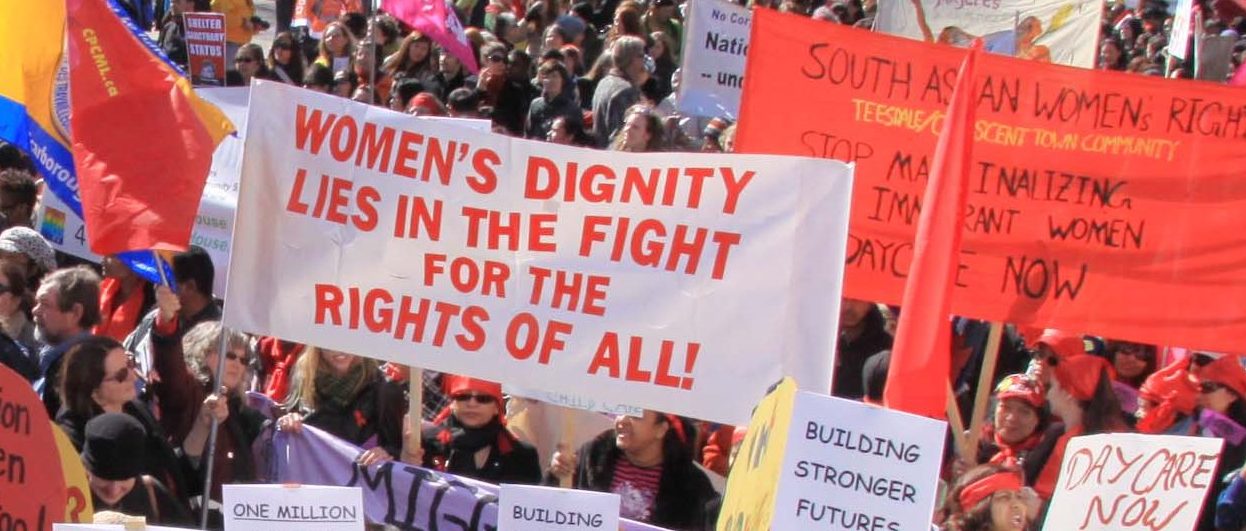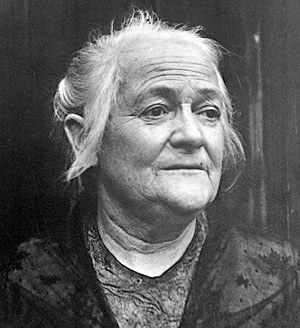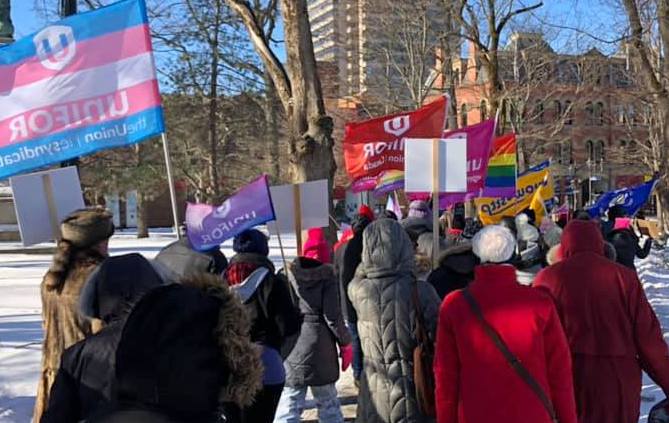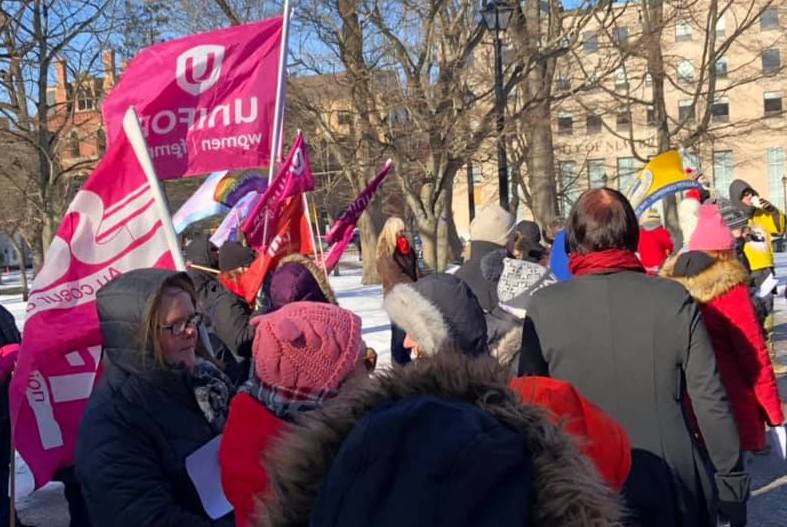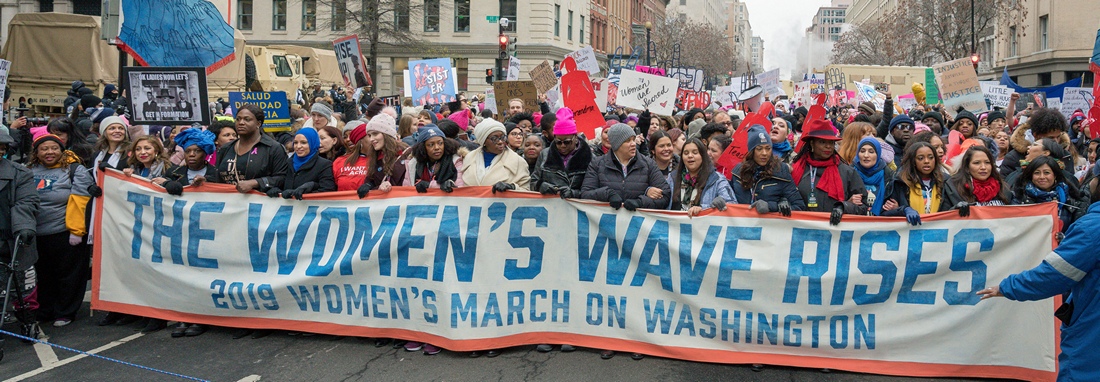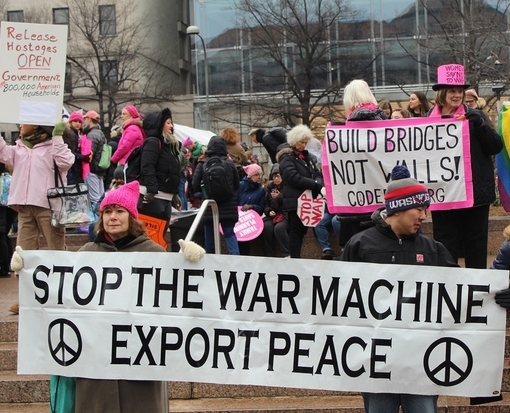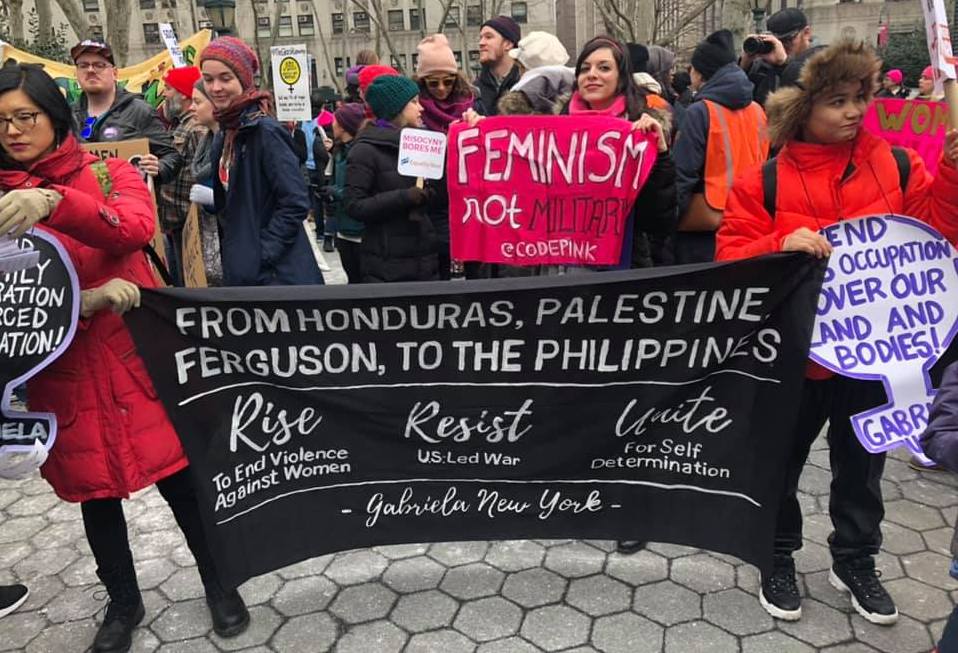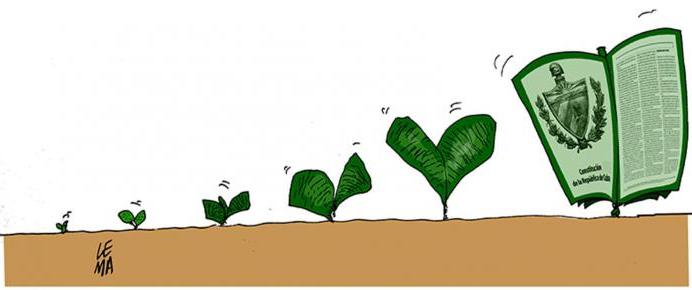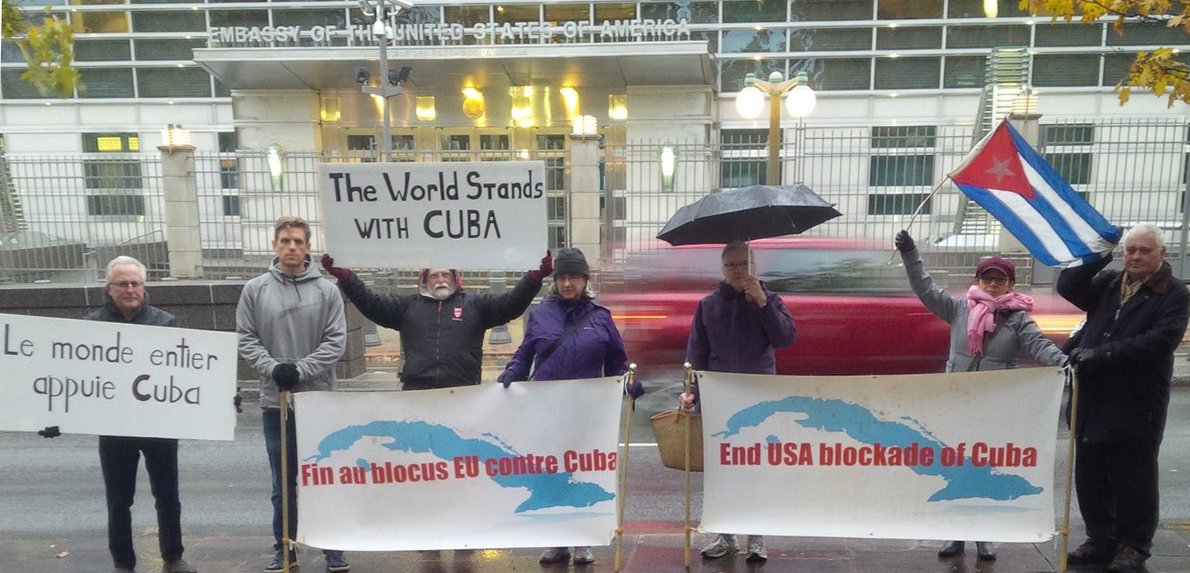
|
March 9, 2019 - No. 8 International Women's Day 2019 All Out to
Support
Our Fighting
• History of International Women's Day - Janice Murray - January
2019
Women's
March
• The
National Energy Board Predictable Redux - K.C. Adams -
• Fraudulent Claims About New Impact Assessment Legislation - Peggy Morton - For Your Information • National
Energy Board Again Recommends Proceeding
• Challenges
Facing Working People from • Stop Paying the Rich -- Increase Funding for Social Programs
For Your Information • Public Funds for Private Partial Upgrader
In Support of Revolutionary Cuba • CBC Used to Justify U.S. War Aims Against Cuba to Canadians - Margaret Villamizar - • Cuba Says YES, Loud and Clear - Granma - • Electoral
Commission Satisfied with Referendum Results U.S. Helms-Burton Act • Statement
Denouncing Escalating U.S. Hostility Supplement • End U.S. Coup and Threat of Invasion Against Venezuela!
International Women's Day 2019 All Out to Support Our Fighting Women and Girls!
|
|
|
"The socialist woman's movement of all countries repudiates the limited Woman's Suffrage as a falsification of and insult to the principle of the political equality of the female sex. It fights for the only living concrete expression of this principle: the universal woman's suffrage which is open to all adults and bound by no conditions of property, payment of taxes, or degrees of education or any other qualifications, which exclude members of the working class from the enjoyment of the right. They carry on their struggle not in alliance with the bourgeois Women's Righters, but in alliance with the Socialist Parties, and these fight for Woman's Suffrage as one of the demands which from the point of view of principle and practice is most important for the democratization of the suffrage."
Stating that the socialist parties in all countries are "bound to fight with energy for the introduction of Woman's Suffrage" it says that the socialist women's movement must take part in the struggles organized by the socialist parties for the democratization of the suffrage, while at the same time ensuring that within this fight the "question of the Universal Woman Suffrage is insisted upon with due regard to its importance of principle and practice."
The resolution to establish International Women's Day states,
"In order to forward political enfranchisement of women it is the duty of the Socialist women of all countries to agitate according to the above-named principles indefatigably among the labouring masses; enlighten them by discourses and literature about the social necessity and importance of the political emancipation of the female sex and use therefore every opportunity of doing so. For that propaganda they have to make the most especially of elections to all sorts of political and public bodies."
The delegates resolved,
"In agreement with the class-conscious political and trade organizations of the proletariat in their country the socialist women of all nationalities have to organize a special Woman's Day, which in first line has to promote Women Suffrage propaganda. This demand must be discussed in connection with the whole women's question according to the socialist conception of social things."
A "Woman's Day" had been organized the previous year in the United States, on the last Sunday in February 1909, by the National Women's Committee of the American Socialist Party. It was marked by demonstrations which highlight the demand for women's suffrage along with the rights of women workers, particularly in the garment trade. Woman's Day honoured the thousands of women involved in the numerous labour strikes in the first years of the twentieth century in many cities, including Montreal, Chicago, Philadelphia and New York. This was a period when women entered the labour force in their thousands and alongside working men fought to organize collectively and to improve their brutal conditions of work.
Later in 1909, needle-trade workers in New York City -- 80 percent of whom were women -- walked off their jobs and marched and rallied for union rights, decent wages and working conditions in the "Uprising of 20,000." The work stoppage was referred to as the "women's movement strike" and continued from November 22, 1909 to February 15, 1910. The Women's Trade Union League provided bail money for arrested strikers and large sums for strike funds during the work stoppage.
Early Celebrations of International Women's
Day
March 19, 1911 was the date set for the first International Women's Day and, implementing the resolution adopted at the Second International Conference of Socialist Women, rallies were held in Austria, Denmark, Germany and Switzerland on that day attended by more than one million women and men. "The vote for women will unite our strength in the struggle for socialism" was the call of these rallies. In addition to their demand for the right to elect and be elected, they demanded the right to work, to vocational training and to an end to discrimination on the job. A woman socialist wrote at that time:
"The first International Women's Day took place in 1911. Its success exceeded all expectation. Germany and Austria on Working Women's Day was one seething, trembling sea of women. Meetings were organized everywhere -- in the small towns and even in the villages halls were packed so full that they had to ask male workers to give up their places for the women.
"This was certainly the first show of militancy by the working woman. Men stayed at home with their children for a change, and their wives, the captive housewives, went to meetings. During the largest street demonstrations, in which 30,000 were taking part, the police decided to remove the demonstrators' banners: the women workers made a stand. In the scuffle that followed, bloodshed was averted only with the help of the socialist deputies in Parliament."
The following year, women in France, the Netherlands and Sweden joined in actions marking International Women's Day. In the period leading up to the declaration of World War I, the celebration of International Women's Day opposed imperialist war and expressed solidarity between working women of different lands in opposition to the national chauvinist hysteria of the ruling circles. For example, in Europe International Women's Day was an occasion when speakers from one country would be sent to another to deliver greetings.
Russian women observed their first International Women's Day on the last Sunday in February 1913 (on the Julian calendar, which corresponded to March 8 on the Gregorian calendar in use elsewhere), under conditions of brutal Czarist reaction. There was no possibility of women organizing open demonstrations but, led by communist women, they found ways to celebrate the day. Articles on International Women's Day were published in the two legal workers' newspapers of the time, including greetings from Clara Zetkin and others.
An essay written in 1920 by a woman communist activist at that time described the 1913 celebration:
"In those bleak years meetings were forbidden. But in Petrograd, at the Kalashaikovsky Exchange, those women workers who belonged to the Party organized a public forum on 'The Woman Question.' Entrance was five kopecks. This was an illegal meeting but the hall was absolutely packed. Members of the Party spoke. But this animated 'closed' meeting had hardly finished when the police, alarmed at such proceedings, intervened and arrested many of the speakers.
"It was of great significance for the workers of the world that the women of Russia, who lived under Czarist repression, should join in and somehow manage to acknowledge with actions International Women's Day. This was a welcome sign that Russia was waking up and the Czarist prisons and gallows were powerless to kill the workers' spirit of struggle and protest."
Women in Russia continued to celebrate International Women's Day in various ways over the ensuing years. Many involved in organizing landed themselves in Czarist prisons as the slogan "for the working women's vote" had become an open call for the overthrow of the Czarist autocracy.
The first issue of "The Woman Worker" (Rabotnitsa), a journal for working class women, was published in 1914. That same year, the Bolshevik Central Committee decided to create a special committee to organize meetings for International Women's Day. These meetings were held in the factories and public places to discuss issues related to women's oppression and to elect representatives from those who had participated in these discussions and the resulting proposals to work on the new committee.
International Women's Day 1917 in Russia
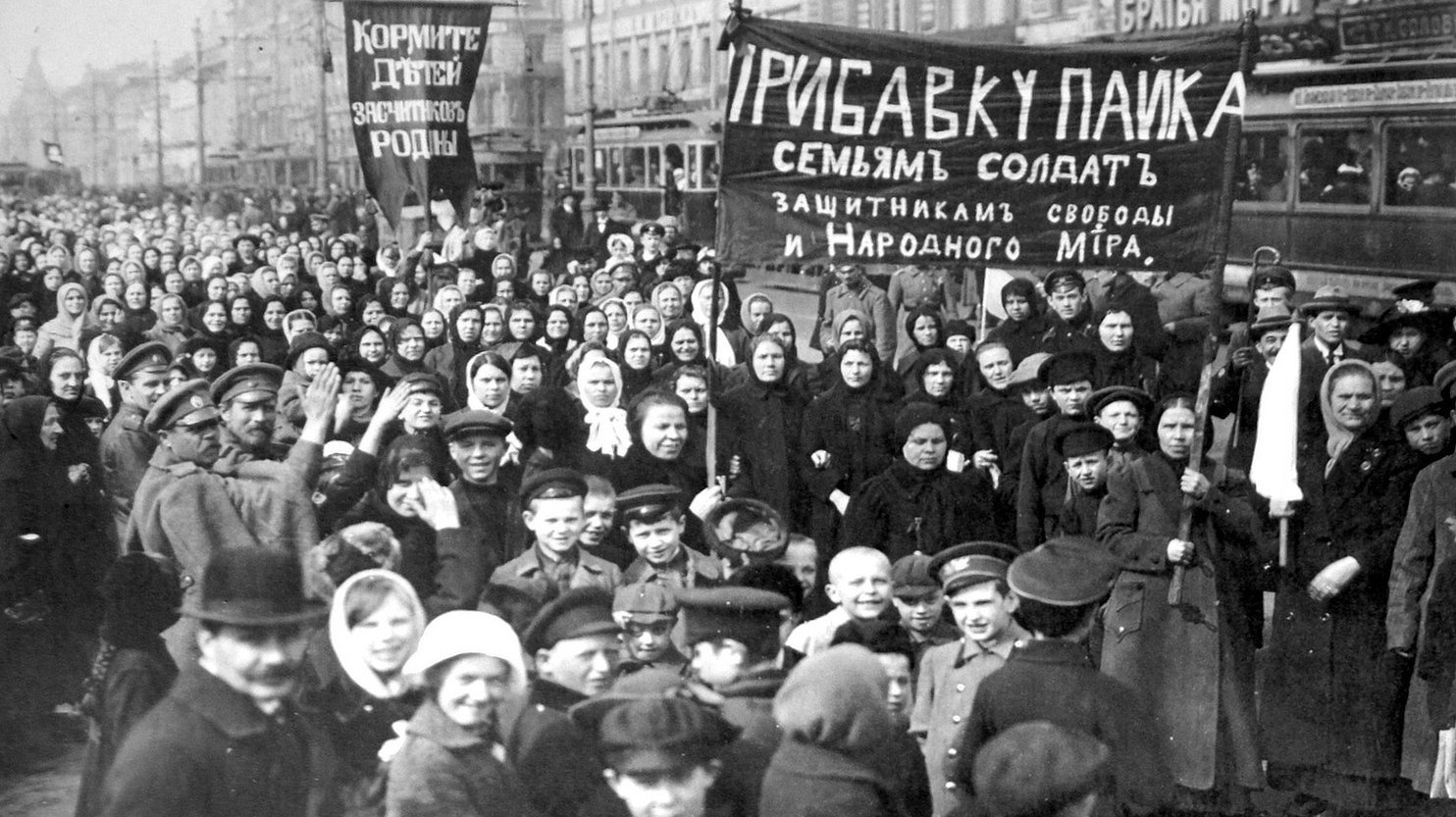
International Women's Day demonstration in 1917 at the Putilov
factory
in Petrograd.
In Russia, International Women's Day 1917 was a time of intense struggle against theCzarist regime. Workers, including women workers in textile and metal working industries, were on strike in the capital city and opposition to Russia's participation in the imperialist war raging in Europe was growing. On March 8 (February 23 on the Julian calendar), women in their thousands poured onto the streets of St. Petersburg in a strike for bread and peace. The women factory workers, joined by wives of soldiers and other women, demanded, "Bread for our children" and "The return of our husbands from the trenches." This day marked the beginning of the February Revolution, which led to the abdication of the Czar and the establishment of a provisional government.
The provisional government made the franchise universal, and recognized equal rights for women. Following the October 1917 Revolution, the Bolshevik government implemented more advanced legislation, guaranteeing in the workplaces the right of women to directly participate in social and political activity, eliminating all formal and concrete obstacles which previously had meant the subordination of their social and political activity and their subservience to men. New legislation on maternity and health insurance was proposed and approved in December 1917. A public insurance fund was created, with no deductions from workers wages, that benefited both women workers and male workers' wives. It meant that women were now treated second to none as neither they nor their children were dependent on spouses and fathers for their well-being.
After 1917
March 8 as International Women's Day became official in 1921 when Bulgarian women attending the International Women's Secretariat of the Communist International proposed a motion that it be uniformly celebrated around the world on this day. March 8 was chosen to honour the role played by the Russian women in the revolution in their country, and through their actions, in the struggle of women for their emancipation internationally.
The first IWD rally in Australia was held in 1928. It was organized by the communist women there and demanded an eight hour day, equal pay for equal work, paid annual leave and a living wage for the unemployed.
Spanish women demonstrated against the fascist forces of General Francisco Franco to mark International Women's Day in 1937. Italian women marked IWD in 1943 with militant protests against fascist dictator Benito Mussolini for sending their sons to die in World War II.
In this way, since 1917, International Women's Day has been both a day of celebration of women's fight for their rights and the rights of all and a day to militantly reaffirm the fight for women's rights which continues to this day and opposition of women to imperialist war and aggression. Its spirit has always been that to win the rights of women and the fight for security and peace, women must put themselves in the front ranks of the fight and of governments which represent these demands.
January 2019
Women's March
Women in
Canada
and the U.S. Speak Out in Their Own Name in Defence of the Rights
of All

Toronto, January 19, 2019.
International Women's Day is being celebrated in North America with the issue of women's rights having been put front and centre of the agenda since the beginning of the year when thousands of women in Canada and the U.S. took to the streets on January 19 to reject the broad anti-social offensive against their rights and the rights of all.
The marches, marking the second anniversary of
the
Women's March on Washington held in 2017 on the occasion of
President
Donald Trump's Inauguration Day, affirmed the front-rank position
of
women against the escalation of the retrogressive anti-social
offensive
which Trump's presidency represents.
In Canada, an end to the violence against Indigenous women and girls and justice for those who have been murdered or gone missing emerged as a predominant demand. A number of the marches took up the call "We Will Not Go Back!" expressing women's determination that those rights which they have won through their century and more of struggle will not be taken away. A joint Windsor-Detroit action honoured all missing and murdered women, demanding an end to gender-based violence.
The U.S. marches expressed the determination of
women to
have a say and control over their human persons and their refusal
to
have what they can do or say dictated by the state. The 2019
march was
especially vigorous as it came on the heels of the 2018 mid-term
elections, where a record number of women, including young women
and
women from various walks of life, were elected in the 116th
Congress --
127, up from 110 in the previous Congress. This is a positive
development.
A key demand this year was for an end to the imprisonment of migrant children and their separation from their parents and to stop the construction of the border wall. Expressions of solidarity with the public sector workers affected by the U.S. government shutdown were features of marches in different local areas. A number of the U.S. marches also put forward the demand for an end to the murders and disappearances of Indigenous women. Other local questions, such as the teachers' strike in Los Angeles, found expression through the speakers at various events. The marches are a vigorous expression of the demands of the movement for rights in the U.S. in which women stand in the front ranks.
Canada
Saint John, NB
Montreal, QC




Ottawa, ON


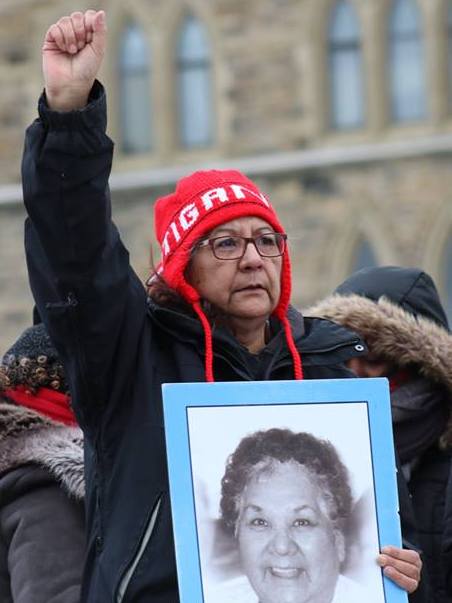

Toronto, ON
Kitchener, ON

Windsor, ON

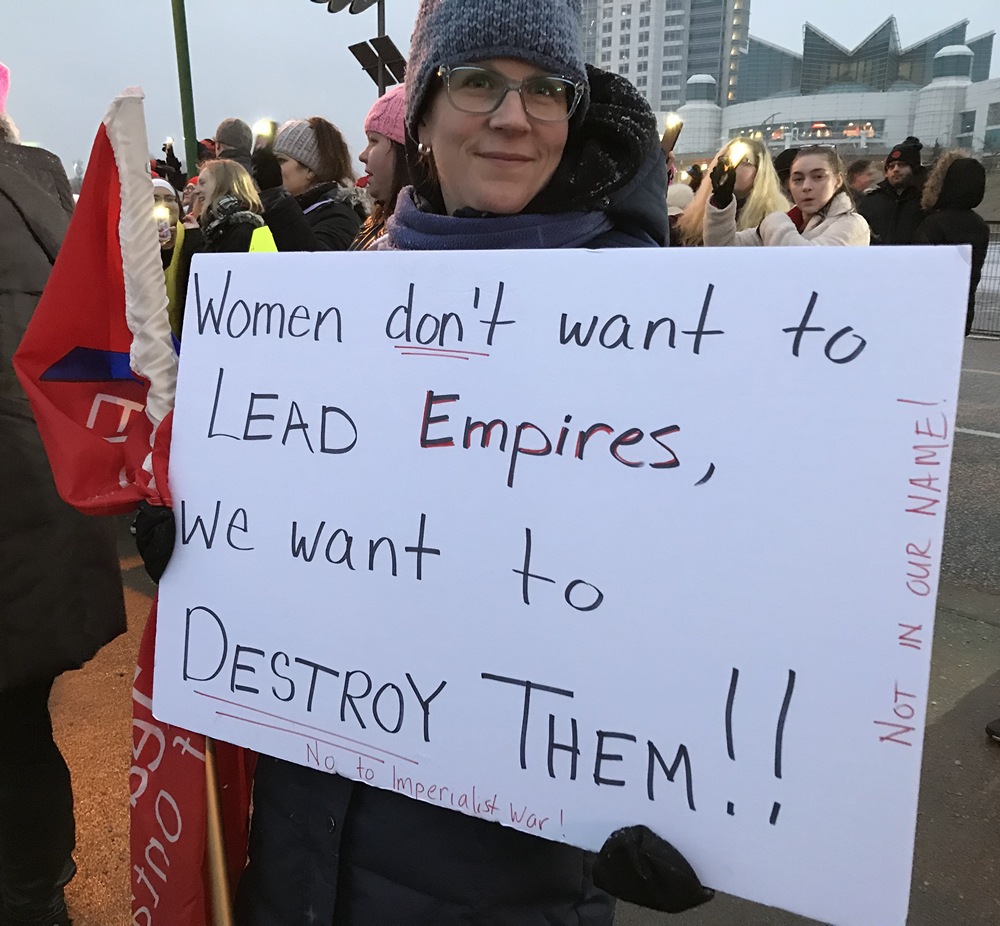

Sudbury, ON



Owen Sound, ON

Sault Ste. Marie, ON


Regina, SK




Edmonton, AB
Calgary, AB




Nelson, BC


Vancouver, BC

Powell River, BC

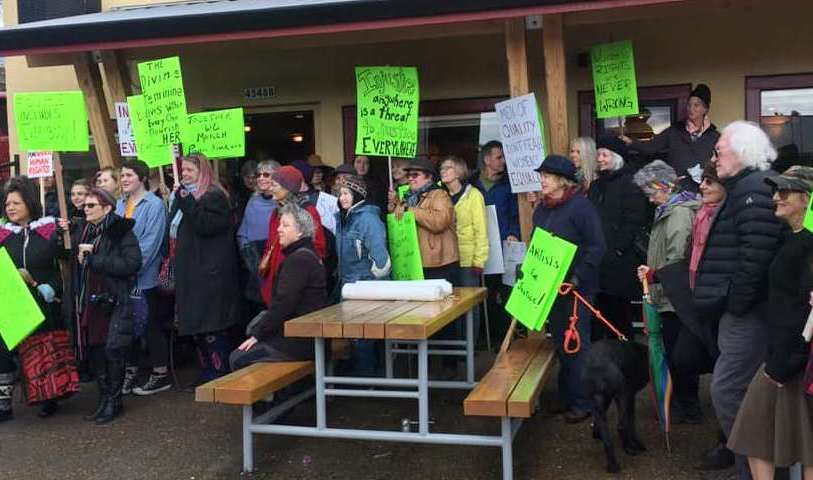
Victoria, BC

United States
Washington, DC
New York City
Portland, ME

Montpelier, VT

Jacksonville, FL

Phoenix, AZ

West River, SD

Oklahoma City, OK

Dallas, TX

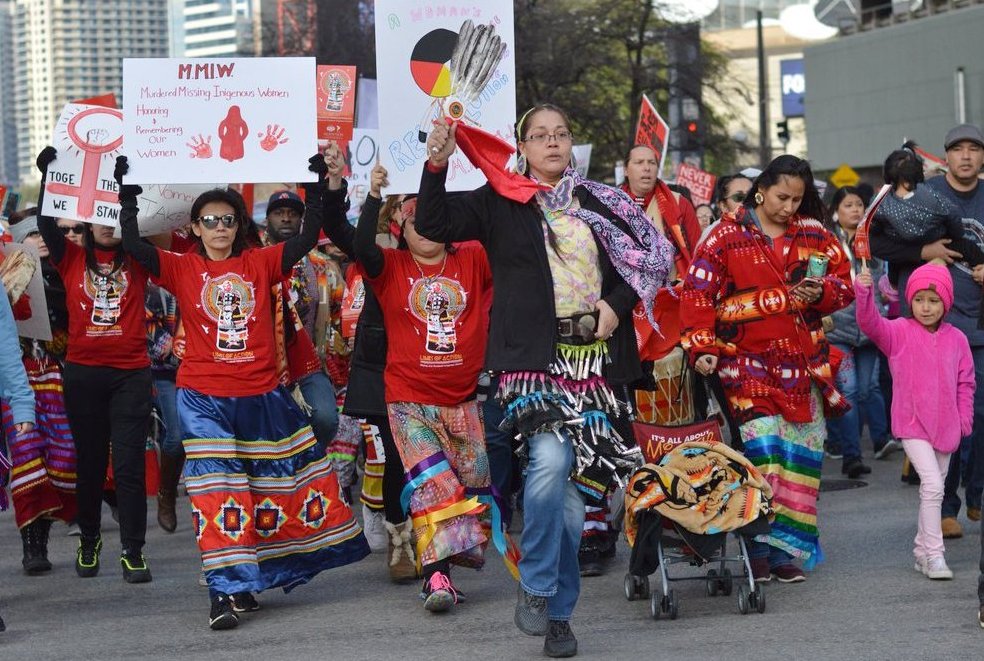
Albuquerque, NM

Los Angeles, CA

San Francisco, CA
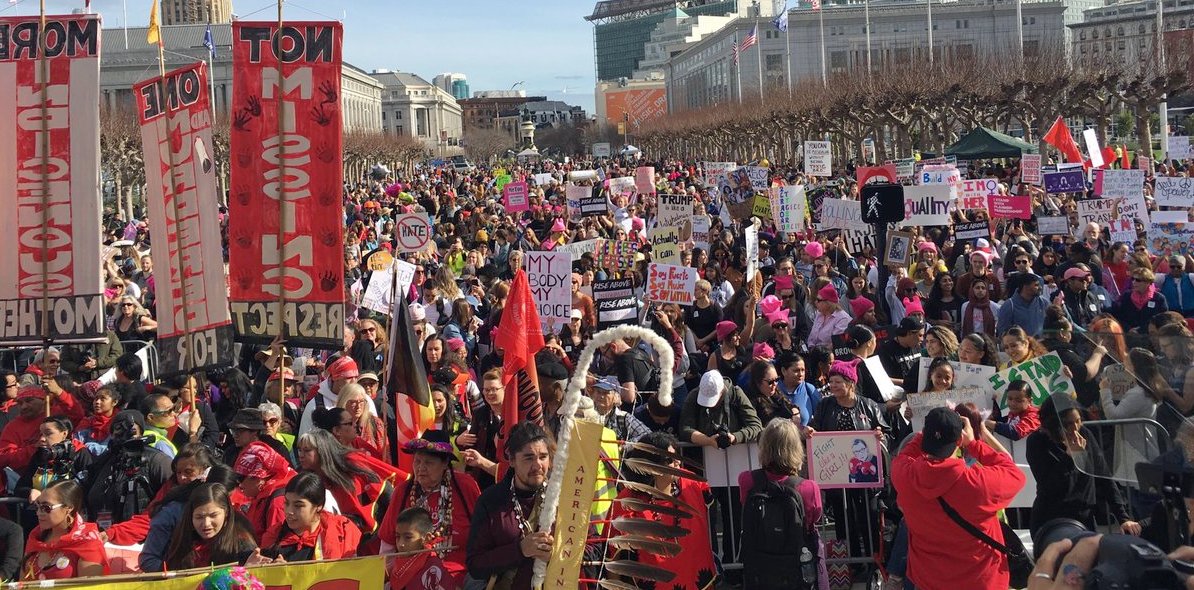
Seattle, WA



Homer, AK

(Photos: TML, Women's March Canada, Edmonton March on Canada, K. Tam-Wong, R. Galbraith, A. Collicott, J. Portilla, D. Parent, T. Sweet, T. Tiziana, Regina YWCA, Y. Cole, M. Qazi, S. Hughes, G. Shilling, K. Coles, Mobilis Mobili, K. Bari, Xinhua, Women's March Maine, kamcc71, T.R. Travis, Shawn, S. Gaughen, R. Vasquez, S. Nair, J.S. Newsom, M. Fleury, E. Stoller, A. Christieansen.)
Matters of Concern to the Polity --
Trans
Mountain Pipeline Expansion Project
The National Energy Board Predictable Redux
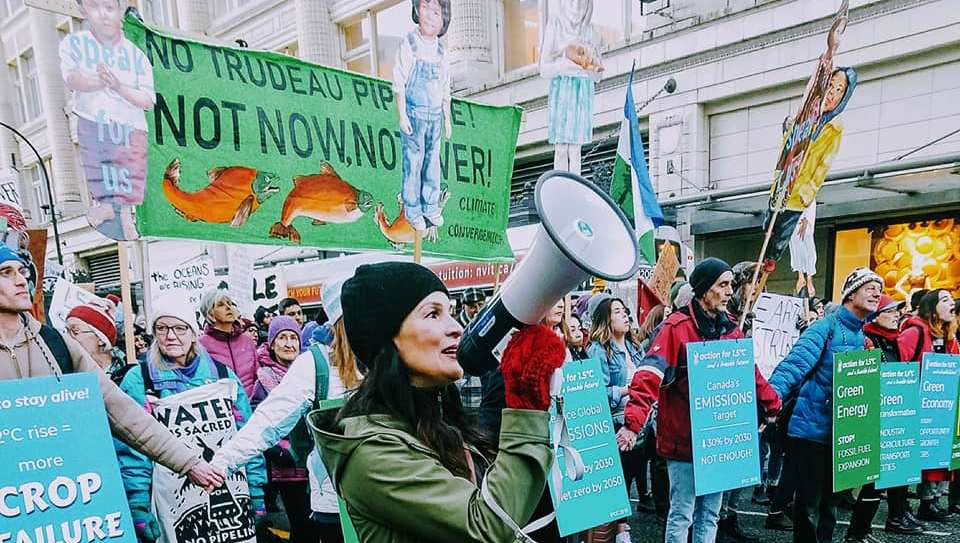
Demonstration in Vancouver against National Energy Board approval
of
pipeline,
February 22, 2019.
The National Energy Board (NEB) has once again approved the Trans Mountain Pipeline expansion project. A successful court challenge of the original approval meant the NEB had to consider the effects of increased tanker traffic in the Salish Sea.
Prime Minister Trudeau has long hailed the project as being in the national interest and a great contributor to jobs and even emphatically declared, "It will be built." His government executive has long expressed enthusiasm for the expansion and even bought the old pipeline and the plans to build a new one from the U.S. owners who had appeared increasingly anxious to dump it.
 Canadians have seen
firsthand from the SNC-Lavalin
affair
that when the PMO declares something important for jobs, the
national interest, and the partisan interests of the Liberal
Party in its goal for re-election, then no quasi-independent
agency of the government or individual politician is allowed to
question and interfere with the government's plans to serve
particular oligarchs.
Canadians have seen
firsthand from the SNC-Lavalin
affair
that when the PMO declares something important for jobs, the
national interest, and the partisan interests of the Liberal
Party in its goal for re-election, then no quasi-independent
agency of the government or individual politician is allowed to
question and interfere with the government's plans to serve
particular oligarchs.
Other events have revealed why the ruling elite feel compelled to push for an additional pipeline to carry heavy crude oil from Alberta to the BC Lower Mainland. The U.S. military wants the heavy crude because once refined it powers many of its planes, ships and vehicles. The existing Trans Mountain pipeline connects with another one transporting some of the crude directly to Washington State, while tankers can fill up in Burnaby and make the relatively short journey south to Washington and California where refineries designed to process heavy oil have an insatiable demand.
The need for heavy crude from the oil sands has also been compounded with the U.S./Canada sanctions, blockade, interference and threats of war for regime change in Venezuela. Heavy crude oil from Alberta and Venezuela is similar. Alberta is being used in part to reduce U.S. purchases of Venezuelan oil and to block it from going elsewhere. This means Alberta oil has come under even closer control of the U.S. imperialists and their campaigns and wars for world domination.
The professed plan to increase heavy oil shipments to Asia has been exposed as never being the intention of twinning the Trans Mountain pipeline to the Lower Mainland. Many have pointed out from the documents of the original NEB hearings that almost all the confirmed purchases of Trans Mountain crude are U.S. refineries or their proxies. By ship, Vancouver is considerably farther from East Asia than BC's northern ports at Prince Rupert and Kitimat. With this in mind, it appears suspicious that the Trudeau Liberals quashed the proposed Enbridge Northern Gateway Pipeline project to build a twin pipeline from Bruderheim, Alberta to Kitimat, BC. The previous Harper federal government in 2014 approved the Gateway project, which many argued would make transshipment to Asia more feasible.
In addition to blocking the Northern Gateway pipeline, the Trudeau government intensified the pressure for an expanded Trans Mountain Pipeline to Vancouver when it passed Bill C-48, the Oil Tanker Moratorium Act in 2018. This legislation bans oil tanker traffic from the waters off both Prince Rupert and Kitimat while not affecting tankers carrying liquefied natural gas or ships carrying other cargo, including goods designated as dangerous. Ironically, the escalating U.S./Canada campaign for regime change in Venezuela may lead the Trudeau Liberals to revive the Northern Gateway project and overturn Bill C-48, allowing the U.S. imperialists to pressure Asians to buy Alberta crude shipped from both Vancouver and Kitimat rather than purchase Venezuelan heavy oil. Reports say that China and south Korea recently purchased several tankers of crude out of Westridge Terminal at discounted prices.[1]
The 2019 NEB reconsideration approval for the Trans Mountain pipeline notes the adverse impact of increased tanker traffic off the southern BC coast but dismisses any concerns in favour of approving the project. The report states, "In consideration of Project-related marine shipping, the NEB recommends that the Government of Canada find that [the adverse effects] can be justified in the circumstances, in light of the considerable benefits of the Project and measures to minimize the effects."
Many in the Lower Mainland cite great concern over increased shipping in the Burrard Inlet as a threat to Vancouver's significant tourist industry, the many beaches, sea wall hiking, recreational boating and to marine life. With the expanded pipeline, tanker traffic travelling to the Westridge Marine Terminal in Burnaby will grow from five to 38 much larger tankers per month.
The NEB approval of Trans Mountain is now in the hands of the federal Cabinet, which of course already purchased the pipeline as a public enterprise and constantly sings its praises. Many observers believe that Trudeau, for tactical cartel party partisan reasons, will wait to approve the project until after this year's October federal election.
Opposition to the Trans Mountain Project has not diminished in the least as Indigenous Nations and others in BC, especially in the Lower Mainland, are vehemently opposed and have refused to give their consent. The Communist Party of Canada (Marxist-Leninist) has examined the economic, political, social and environmental arguments for the project and deems them lacking in substance.[2] The project is destined to feed the U.S. war economy and its insatiable demand to power its active military operations for world hegemony and regime change where it suits its interests, which is a grave danger for all humanity. Canadians want an alternative to integration into the U.S. imperialist system of states and war economy. An important aspect of seeking an alternative is opposing the present direction.
Notes
"Three crude cargoes loading in November from Vancouver were bought by Chinese companies, with the first cargo for November 10 loading taken by China National Offshore Oil Corporation, or CNOOC, a shipping source with close knowledge of the matter said.
"CNOOC had also chartered an Aframax tanker, the Nordtulip, to ship crude from the Westridge Terminal in Vancouver to China that was loaded on October 13, at a lump sum rate of $1.2 million, the shipping source said.
"Chinese traders indicated that CNOOC could have taken either heavy sour Cold Lake Blend or Western Canadian Select crude into its latest shopping basket, but a company official declined to comment on the heavy sour Canadian grade it has purchased.
"The latest round of Canadian crude purchases came on the heels of rapid decline in Australian heavy sweet crude output, coupled with a sharp slowdown in China's imports of heavy crude from Venezuela.
"ChemChina typically led the independent sector's heavy crude purchases from Australia but that's a dying trend now [due to limited availability] ... it's no surprise to see China's search for heavy crude oil stretching to Canada," said a sweet crude trader based in Beijing.
"Apart from Chinese end-users, south Korean refiners had also picked up a few Cold Lake Blend cargoes earlier this year.
"The U.S. sanctions on Venezuela's state-owned PDVSA in January could block exports of roughly 500,000 b/d of Venezuelan crude bound for U.S. Gulf Coast refineries. For Asian buyers, this would mean that crude supplies from Saudi Arabia and Iraq that would typically flow to the region would be diverted to U.S."
2. TML Weekly has reported extensively on the Trans Mountain Pipeline Project and the integration of Canada's energy sector into the U.S. war economy. Many of these articles are listed below in chronological order:
- TML Weekly, January 30, 2016.
- "Decisions
on
Northern
Gateway
and
Trans
Mountain
Pipelines:
Where
Sovereignty
Must
Be
Vested
in
a
Modern
Nation," Peggy Morton, TML
Weekly, August 6, 2016.
- "Approval
of
Kinder
Morgan
and
Enbridge
Line
3
Pipelines:
Two
Very
Different
and
Distinct
Canadas Have Emerged," Philip Fernandez, TML
Weekly, December 10, 2016.
- "Looking
at
the
Hype
About
Pipelines," Peggy Morton, TML Weekly, March 4,
2017.
- "Opposition to Illegal Pipeline Expansion on Traditional Kanien'kehá:ka Territory," TML Weekly, October 3, 2017.
- "Trans Mountain Pipeline Dispute Between BC and Alberta: Splitting the Polity in the Service of Contending Private Interests," TML Weekly, February 24, 2018.
- "More
on
TransMountain Pipeline Controversy: Clash of Interests Between
Energy Monopolies and Working People," Peggy Morton, TML
Weekly, March 10, 2018
- "March
and Rally in
Burnaby, BC Against Kinder Morgan Pipeline Extension: Thousands
Take a Stand -- No Consent! No Pipeline!," TML Weekly,
March 17, 2018.
- "Opposition
to
Kinder
Morgan
Trans
Mountain
Pipeline
Project:
No
Consent
--
No
Pipeline!,"
K.C. Adams, TML Weekly, April 21, 2018.
- "No Consent, No Pipeline!: Militant March in Vancouver Against Kinder Morgan Pipeline Expansion," TML Weekly, May 19, 2018.
- "Major Agenda Item for NAFTA Negotiations Fueling the U.S. War Machine," K.C. Adams, TML Weekly, May 26, 2018.
- "Trudeau
Government
Buys
Trans
Mountain
Pipeline
in
Massive
Pay-the-Rich
Scheme:
No
Consent!
No
Bailout!
No
Pipeline!
Stop
Paying
the
Rich!," TML
Weekly, June 2, 2018.
- "Federal
Court
of
Appeal
Overturns
Approval
of
Trans
Mountain
Pipeline," Peggy
Morton, TML Weekly, September 8, 2018.
- "More
Shenanigans
Surrounding Trans Mountain Pipeline Trudeau Government's
Definition of
'Getting It Right,'" Peggy Morton, TML
Weekly, October 13, 2018.
- "Another Collapse of Oil Prices in Alberta: The Need for Working Class Politics and a Modern Outlook," Dougal MacDonald, TML Weekly, December 1, 2018.
The Imperialist Fraud of Balance
Finding a supposed balance between two diverse but related phenomena is a common imperialist fraud to promote narrow private interests. One of the most common is to find a balance between the economy and environmental concerns to divert people from exposing and thinking about the absence of politics of social responsibility.
This imperialist practice distracts attention away from the necessity to find solutions to problems in both the economy and the environment. Those problems have their own particularities that need to be studied and solved with investments while at the same time taking into account their relation with other phenomena.
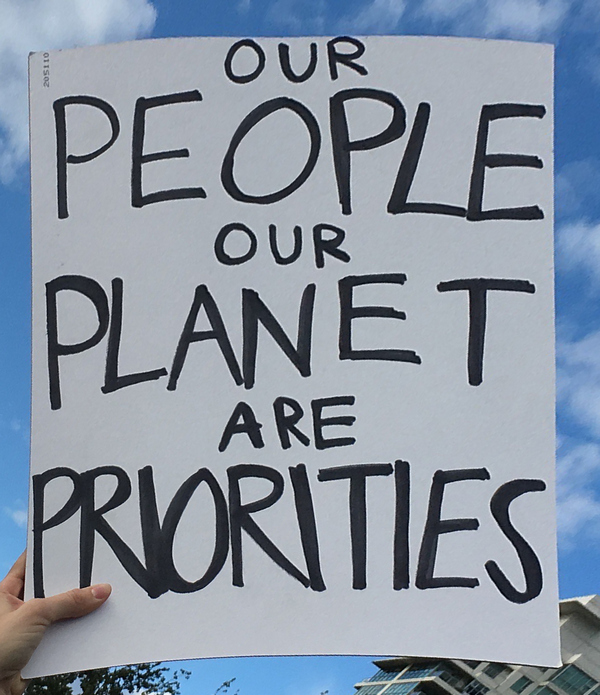 The practice of
finding a
concocted balance instead of
real
solutions to real problems exposes the unwillingness of the
imperialists to recognize and solve problems as they pose
themselves, objectively, both in the economy and environment. The
imperialists invoke the fraud of balance to avoid analyzing,
discussing and investigating the concrete problems and finding
solutions that require investments of the added-value they want
to expropriate as private profit.
The practice of
finding a
concocted balance instead of
real
solutions to real problems exposes the unwillingness of the
imperialists to recognize and solve problems as they pose
themselves, objectively, both in the economy and environment. The
imperialists invoke the fraud of balance to avoid analyzing,
discussing and investigating the concrete problems and finding
solutions that require investments of the added-value they want
to expropriate as private profit.
The imperialists say a balance must be struck between the needs of developing the economy and protecting the environment. This fraud avoids the truth that both the economy and environment have their own particular aspects and problems that need to be solved as well as those that are interrelated.
Within this refusal to take up the concrete analysis of concrete conditions and find real solutions to real problems is the motive of production to make as much money as possible in the shortest time. This motive of the ruling imperialist class blocks the solving of problems that arise in both the economy and the environment as a consequence of the development of the modern productive forces of industrial mass production. The motive of the rich compels them to take money out of the economy instead of reinvesting it back into the economy to solve the problems that inevitably occur as the productive forces become more complex and vast, such as hydraulic fracturing for oil.
This is particularly evident in the problems that arise in the environment where no immediate profits can arise from solving problems but on the contrary require added-value be devoted to finding solutions for environmental degradation and the necessity for remediation along with broader issues such as climate change. The motive of the rich is too narrow to tackle problems as they present themselves. Pragmatic considerations to expropriate profits in the moment preclude the following of principles and long-range scientific planning within a motive in conformity with the modern productive forces and the necessity for social responsibility.
A glaring example has been the development of nuclear energy and the refusal of the imperialists to find solutions to the problem of radioactive waste. Another is the abandonment of mines, oil rigs, drill sites etc. and the need to clean up industrial sites such as pulp mills that have spilled mercury into northern lakes and rivers, and places like century-old Stelco steel-producing land in Hamilton and other facilities that have either exhausted their productive life or for one reason or another are considered no longer able to produce maximum profit for private interests in their present state and are wanted for another purpose.
Investing in environmental remediation can divert money from private profit and that violates the imperialist motive of production. Companies generally cast off their unwanted property through bankruptcy protection or demand public funds to repair damage before any action is taken. The absence of the politics of social responsibility is clearly related to the imperialists' motive of production and their control over it, and their contention that private property trumps human rights.
Regarding the review of the Trans Mountain Pipeline project, the National Energy Board (NEB) report says, "The Board has undertaken this Reconsideration in accordance with the requirements of the NEB Act" that requires the NEB "to weigh and balance the overall benefits and burdens of the Project."
 In weighing and
balancing
the benefits and burdens of
the project, "the NEB recommends that the Government of Canada
find
that (the adverse effects or burdens) can be justified in the
circumstances, in light of the considerable benefits of the
Project and measures to minimize the effects."
In weighing and
balancing
the benefits and burdens of
the project, "the NEB recommends that the Government of Canada
find
that (the adverse effects or burdens) can be justified in the
circumstances, in light of the considerable benefits of the
Project and measures to minimize the effects."
This is a fraud in the sense that the project itself must find solutions to the problems the development poses and not dismiss them in such a cavalier manner. The project cannot be justified if it violates the rights of the people or refuses to recognize and solve the problems presented within the environment in the here and now and future. Human rights cannot be minimized, ignored or marginalized, as they belong to people by virtue of being human and cannot be violated for any pragmatic or other spurious reason.
Solutions to the problems of guaranteeing the rights of all, including those of the Indigenous peoples, and solving the problems of "burdens" on the environment must become part of the overall value of a project. This overall value would necessarily increase the price of production and the market price of the commodity in question, heavy oil. The increased price of production would go in part towards environmental remediation or solving the problems that industrial mass production poses. This would of necessity reduce the rate of profit of the enterprise with added-value going towards humanizing the social and natural environment and guaranteeing the rights of all rather than fattening the pockets of the already bloated global oligarchs.
This reminds everyone that the modern economy is comprised of the struggle for production, scientific experimentation and class struggle. The leading aspect at this time in history is class struggle, which essentially means to bring the relations among people within the economy, along with the social class in control and its prevailing motive of production, into conformity with the level and character of the modern socialized productive forces.
The antagonistic dialectical relation between employer and employee is in contradiction with the socialized productive forces and must be resolved, not balanced, so that a new synthesis representing the actual producers comes into being and asserts its control, along with a new motive of production, to guarantee the rights, security and well-being of all and to humanize the social and natural environment.
Senate Hearings on Bill C-69
Fraudulent
Claims
About New
Impact
Assessment Legislation
The Senate Standing Committee on Energy, the Environment and Natural Resources began its hearings on Bill C-69 on February 5.[1] Bill C-69 is an omnibus bill which will replace the National Energy Board with the Canadian Energy Regulator and establish the Impact Assessment Agency of Canada as the agency to carry out impact assessments on projects such as pipelines, electricity transmission lines, and mines (see here).
The Committee will now go on a nine-city tour, and submit its final report by May 9, after which the bill will go to third reading in the Senate.
The full title of Bill C-69 is An Act to enact the Impact Assessment Act and the Canadian Energy Regulator Act, to amend the Navigation Protection Act and to make consequential amendments to other Acts. It establishes the Impact Assessment Agency as the authority responsible for impact assessments. The bill states that its purpose is to "provide for a process for assessing the environmental, health, social and economic effects of designated projects with a view to preventing certain adverse effects and fostering sustainability."
The energy oligarchs and monopoly media have painted Bill C-69 as a monstrous attack on the energy industry, even its very death knell. Writing in the Calgary Herald, columnist Licia Corbella stated, "If you think it's hard to get any significant resource project built in Canada now, just wait. Justin Trudeau's federal government has dreamed up a bill so destructive it just might be the bookend to his famous father's disastrous and infamous National Energy Program. Also in the Herald, columnist Don Braid said that the bill is a "grave danger to the Trans Mountain pipeline ... This beast should be ritually slaughtered."
Martha Hall Findlay, President of the Canada West Foundation and a former Liberal Member of Parliament said that if Bill C-69 becomes law, Canada could "Kiss our investment climate goodbye. Investors -- domestic, foreign, current, potential -- their commentary is overwhelming. They say, 'if this passes, we're going elsewhere.'"
The Trudeau government for its part has presented Bill C-69 as a vast improvement over the existing legislation enacted under the Harper government in 2012, when it is actually quite similar. These improvements are said to include a planning process which will take into account and place greater emphasis on the impacts on the rights of the Indigenous peoples in Canada. Second, rules around who can get intervenor status would revert to the pre-2012 arrangements. Harper's 2012 legislation restricted intervenor status to people directly affected by a project (e.g. the pipeline crosses their land). Third, a number of considerations have been added to those which the Impact Assessment Agency must take into account.
It is all a fraud, and neither claim has any foundation in fact. After all the hyperbole, the Canadian Association of Petroleum Producers (CAPP) has now declared that it doesn't want the bill killed after all. Killing the bill would "tear up years of work and not provide any more certainty to the industry," stated Tim McMillan, President of CAPP. Senator Grant Mitchell who sponsored the bill in the Senate said he is open to amendments, as are the prime minister and environment minister, confirming that the fix is in. The energy oligarchs actually don't want to keep the current legislation brought in by the Harper government to meet their demands at that time, but to further degrade the regulatory process. CAPP's "aspirational goals" set out in its Alberta "elections platform" call for total time to get a project approved to be cut by 50 per cent and limits placed on Cabinet authority to "stop the clock" on a project. As well, the cost to industry should be slashed and the already enormous pay-the-rich schemes increased. Concerned citizens, including scientists, should continue to be prevented from having intervenor status at the impact assessment hearings.
The context for all this is the frenzied competition for control of resources and markets and the grandiose plans of the energy oligarchs with oil sands assets to displace their "competitors," particularly in markets on the U.S. Gulf Coast and California. CAPP says six new pipelines are needed in order to more than double oil sands production, replacing Venezuelan oil on the Gulf Coast and imports from the Middle East and elsewhere in California. There is much talk of Asian markets in order to deflect from the reality of increased reliance on exports to the U.S.
It is the well-known road of boom and bust and jobless "recovery." Canada's resources and the work-time of Canadians are used in the violent competition of the international cartels and in service to the U.S. war machine and economy, necessarily leading to destruction and insecurity through war, sanctions, "regime-change" and other means. The social and natural environment, the need to take measures to deal with climate change, and the rights of the Indigenous peoples are all to be sacrificed to enrich the tiny minority. It is a direction opposite to that required to build a self-reliant economy based on meeting the needs of the people with trade for mutual benefit.
The desperation of governments to do the bidding of the energy oligarchs and big banks and the state arrangements which are made to benefit private interests shows the depth of the crisis facing the cartel parties and ruling circles. There it is in plain sight. It is not a pretty sight, but the more the cartel parties and state apparatus are shown to serve the rich and maintain their class privilege, the more the need for renewal of the democracy reveals itself. Who decides has become the crucial question and the challenge facing the working class is to bring forward their own Worker Politicians and a Workers' Opposition in the Parliament.
For Your Information
National Energy Board Again Recommends Proceeding with Trans Mountain Expansion Project
Posted below are extracts from the National Energy Board[1] statement and report released February 22.[2]
***
The National Energy Board (NEB) today delivered its Reconsideration report to the Government of Canada, with an overall recommendation that the Trans Mountain Expansion Project is in the Canadian public interest and should be approved.
If approved [by the Federal Cabinet], the Project would expand the existing Trans Mountain Pipeline system between Edmonton, Alberta and Burnaby, British Columbia, nearly tripling its capacity to ship oil from 300,000 to 890,000 barrels per day [...]. The Project includes approximately 987 kilometres of new pipeline, new and modified facilities, such as pump stations and tanks, and the reactivation of 193 kilometres of existing pipeline. The Westridge Marine Terminal (WMT) would also be expanded. Oil would be loaded onto tankers at the WMT for transit to Washington State, California, and Asia. [The Trans Mountain Pipeline connects with the Trans Mountain Puget Sound Pipeline at Abbotsford, BC in the Lower Mainland before its final destination in Burnaby. The Puget Sound pipeline carries some of the Alberta heavy crude directly to Washington state refineries in Anacortes, Cherry Point and Ferndale -- TML Ed. Note.]
Reason for reconsideration of the original approval:
In May 2016, after an approximately two-year regulatory review, the Board issued its Report recommending that the Governor in Council (GIC) approve the Project.
On August 30, 2018, the Federal Court of Appeal in Tsleil-Waututh Nation v. Canada (Attorney General) set aside [the approval], in part because, in the Court's view, the Board unjustifiably excluded Project-related marine shipping from the scope of the "designated project."
On September 20, 2018, the GIC [directed] the Board to conduct a Reconsideration taking into account the environmental effects of Project-related marine shipping [...] and the adverse effects of Project-related marine shipping on species at risk.
The Board has undertaken this Reconsideration in accordance with the requirements of the NEB Act [...] and with the Canadian public interest as a guide. Weighing the public interest, as required by the NEB Act, is not a rigid or mechanical task. It is a complex, flexible, and multifaceted inquiry that requires the Board [...] to weigh and balance the overall benefits and burdens of the Project; and to draw conclusions. This consideration of benefits and burdens also informs the Board's recommendation [...] regarding whether any significant adverse environmental effects can be justified in the circumstances.
The Reconsideration report concludes that Project-related marine shipping is likely to cause significant adverse environmental effects on the Southern resident killer whale and on Indigenous cultural use associated with the Southern resident killer whale.
The NEB also found that greenhouse gas emissions from Project-related marine vessels would likely be significant.
While a credible worst-case spill from the Project or a Project-related marine vessel is not likely, if it were to occur the environmental effects would be significant.
In consideration of Project-related marine shipping, the NEB recommends that the Government of Canada find that [they -- the adverse effects] can be justified in the circumstances, in light of the considerable benefits of the Project and measures to minimize the effects.
The considerable benefits of the Project include:
- increased access to diverse markets for
Canadian oil;
-
jobs created across Canada;
- the development of capacity of
local and Indigenous individuals, communities and businesses;
- direct spending on pipeline materials in Canada;
- and
considerable revenues to various levels of government.
Notes
1. The National Energy Board is an independent federal regulator of several parts of Canada's energy industry. It regulates pipelines, energy development and trade in the public interest with safety as its primary concern.
2. The regulator's full 689-page report is
available here.
Alberta Government's Pay-the-Rich Schemes
Challenges
Facing
Working People from
an Economy They Do Not Control
The protests in Alberta since October and November of last year and the significant convoy of trucks from Alberta which reached Ottawa on February 19, and rallied on Parliament Hill raised the crucial question: Is there an alternative to the present direction of the economy?
 The people of Alberta
have
been through many
difficulties
over the last decade. The global economic crisis in 2009
precipitated a significant drop in the demand for energy
products. The fall in demand was accompanied with a huge surge of
supply by U.S. producers of light crude oil using the technique
called hydraulic fracturing or fracking. The result was a
precipitous plunge in the global market price of all grades of
oil in 2014. Of course when the most significant sector of the
Alberta economy goes into recession this affects all sectors, as
jobs disappear and the circulation of social wealth slows to a
trickle.
The people of Alberta
have
been through many
difficulties
over the last decade. The global economic crisis in 2009
precipitated a significant drop in the demand for energy
products. The fall in demand was accompanied with a huge surge of
supply by U.S. producers of light crude oil using the technique
called hydraulic fracturing or fracking. The result was a
precipitous plunge in the global market price of all grades of
oil in 2014. Of course when the most significant sector of the
Alberta economy goes into recession this affects all sectors, as
jobs disappear and the circulation of social wealth slows to a
trickle.
Working people have been stunned at the suddenness, severity and persistence of the downturn. Many towns and regions heavily dependent on the energy sector began a decline that has only slightly moderated over time if at all. Added to this was the catastrophic flooding in 2013 of Calgary and the surrounding region, and three years later the wildfires that swept through much of northern Alberta prompting the evacuation and significant destruction of the town of Fort McMurray and damage to much of the oil and other infrastructure in the region.
The now decade-long crisis in the energy sector
is not
the
first occurrence but this one feels worse as more is at stake. To
fulfill the requirement for workers in the growth of the sector,
the population of Alberta has been on a steady incline from one
million people in 1953 to 4.3 million today. A significant
investment has occurred in the oil sands where projects now exist
that dwarf anything from the past. To service this production, a
vast working infrastructure has been created of roads, bridges,
railways, pipelines and electrical transmission lines. Nothing
happens without working people, so schools, hospitals, housing,
retail outlets and other social infrastructure and public
services have been built with much of it geared towards
sustaining the energy sector and in return needing its social
wealth for overall exchange of goods and services.



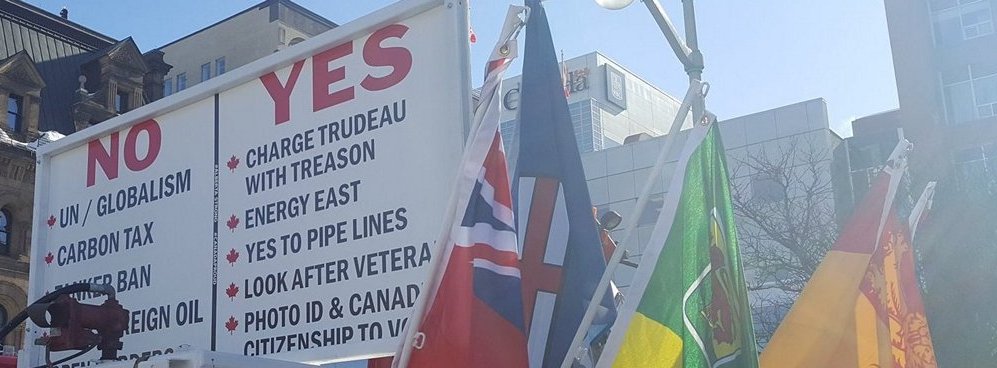
Signs and slogans on the trucks taking part in the convoy
highlighted
demands that the federal government ensure the well-being of
those
workers and communities, especially in Alberta,
whose livelihoods rely on the oil and gas industry.
This does not mean that Albertans only work in the energy sector -- far from it -- but the dominance of the sector and the number of people directly and indirectly connected to it is so huge the current downturn feels particularly severe and long lasting and without any real solutions in the offing. The cry for more pipelines from some and carbon taxes from others divert attention when something more substantive is required. Within this the most frustrating aspect just may be the lack of discussion on an alternative, including a principled plan to build an independent diverse economy secure from the problems, pressure and thievery of the globalized imperialist war economy, one that could play a positive role in showing how to combat climate warming in ways that do not harm the economy and working people. The human brain and work that gave rise to the current developments is quite capable of coming up with solutions to put Alberta and Canada on a socially responsible sustainable path.
Finding a path forward with a viable alternative
is the
tough part when the working people do not control either media
disinformation or that of governments and political parties in
government vying for election to form the next government. Most
important, they do not control the economy, in particular the
energy
sector. Finding and elaborating an alternative means taking up
the
independent politics of the working class and ending the control
of the
sector by the global financial oligarchy. Ploughing the
accumulated
social value from the energy sector back into the economy to
diversify
and extend it would create a bulwark under the control of
Albertans
that may bend when international crises erupt but would not break
in
its commitment to guarantee the livelihoods, security and
well-being of
all. Control in Alberta would allow for a significant portion of
the
social wealth energy workers produce to be directed towards the
development of an independent all-sided economy of which the
energy
sector would play a significant role but would not boom or go
bust as
is the case today. This also means using the resources and value
workers produce as seed money to find solutions to environmental
degradation and carbon emissions and to bring them under control
in a
planned scientific way.
Many Albertans scratch their heads and question how such massive amounts of social wealth they have produced over the years has given rise to so little stability and security. How could it be that a fall in the global price of oil and the price others are willing to pay for Alberta oil can have such a devastating effect on the entire economy and province after all these years of producing stupendous social wealth? A major problem the workers have to reckon with is that the private interests in control of what Albertans produce have absolutely no concern or even connection with the people who live here and have spirited away much of the produced wealth.
This is most markedly seen in the simplistic agenda that the ruling elite give as solutions to the crisis. The agenda can be summed up as "more of the same." The "more of the same" may change somewhat in its practical form but the essence remains the same: more production of energy in one form or another for sale outside Alberta at prices and demand under the control of the global financial oligarchy. In the current context the agenda has centred on the issue of transporting oil, especially bitumen, through pipelines east, south and west to tidewater.
The ruling elite, especially the global oligarchs
in
control
of the energy sector and their representatives in government have
set the agenda of "more of the same," which many characterize as
a form of mental illness called perseveration. The working people
are expected to be satisfied with this agenda of "more of the
same" and are directed to stake their positions and even their
futures on supporting it. After all the oil is there; let's get
at it as fast as possible, for the only pragmatic and sensible
thing to do is to put money in our pockets now without any notion
of a future or the dangers involved when one forges ahead like a
maniac without principles or a long-term scientific plan.


A protest of 150-200 people at the intersection of Wellington
and Metcalfe Streets near Parliament Hill on February 20, 2019,
prevented the United We Roll convoy and its scheduled speakers
from
addressing their rally from a hydraulic lift as planned. The
action
rejected the use of economic concerns to justify racist and
misogynistic statements by some convoy participants and
supporters.
The action also affirmed the right of Indigenous peoples to
informed
consent to pipelines on their territories, including the right to
say No.
Those who declare that the agenda of the oligarchs for "more of the same" is simplistic and without any guiding principles and want something more thoughtful to discuss are branded as outcasts and naysayers who oppose the oil industry and quite likely want carbon taxes and secretly desire to return to a horse and buggy economy. Similarly, those who are concerned about their livelihoods and think they can be achieved by building pipelines are called red necks, anti-immigrant and more. The oligarchs in control of the energy sector resort to this name-calling and shaming to divert attention from the fact that they are responsible for the economic crisis and they do not want to be held to account. They are the ones who put the economy under this cloud of control from outside leaving Albertans vulnerable and without any control over their own economy, future and security. The global oligarchs do not want to give up any of their control to Albertans and the most effective way of doing that is to declare with authority and conviction backed up with police power, "There is no alternative to the current direction!"
No alternative means no discussion, no investigation, no speaking, no thinking, no getting together to discuss the possibilities that exist in an independent all-sided economy that uses the great natural resources that exist for the benefit of the people. An alternative exists that leads to stability and prosperity under the control of Albertans and holds high the principles of guaranteeing the well-being of all and humanizing the natural and social environment. To get there it is necessary to break through the perseveration of the ruling elite that is meant to perpetuate their class privilege and control. By stating clearly that there is an alternative and uniting the people in action to find it, the control of the ruling elite over the economy and affairs of state can be taken over in favour of the people.
Yes and No Agenda
The economic crisis in Alberta and the response to it has been much in the news of late. A provincial election is expected to take place soon, in April or May of this year. The crisis and what to do about it, along with the program of the Notley government loom large in what goes for news coverage and analysis, the main thrust of which is a yes and no agenda. The rich and those who serve them in government, along with the media, have set this yes and no agenda: yes and no to pipelines, yes and no to oil to tidewater, yes and no to oil tankers, yes and no to carbon-based fuel, yes and no to carbon taxes, yes and no to shipping oil by rail; Alberta loves oil, others hate oil; consultation with Indigenous nations but no veto and no full participation in planning and developing their territories using the resources that are there or infrastructure that passes through.
 In all this back and
forth
of yes and no, collective
discussion of an alternative direction and agenda for an
all-sided pro-social economy independent of the demands of the
U.S. imperialists, their war machine and the global oil barons is
quashed. A people's agenda disappears or never sees the light of
day because those in a position of authority and in the mass
media use all their power, including the police power, to block
the
development of an alternative and the collective discussion
necessary to get us there.
In all this back and
forth
of yes and no, collective
discussion of an alternative direction and agenda for an
all-sided pro-social economy independent of the demands of the
U.S. imperialists, their war machine and the global oil barons is
quashed. A people's agenda disappears or never sees the light of
day because those in a position of authority and in the mass
media use all their power, including the police power, to block
the
development of an alternative and the collective discussion
necessary to get us there.
Nonetheless, Alberta is part of a region which
possesses vast
human and natural resources. Alberta alone has a population of
4.3 million people and there are another million next door in
Saskatchewan and another million in Manitoba, all interconnected
with the Prairie and the northern territories. It has vast
agriculture, oil, natural gas, coking coal for steel, uranium,
timber, diamonds, potash, wind and sun galore and more, replete
with an experienced working class. Why the recurring crises? Who
or what is blocking the development of the New and why?
The possibilities are endless for the region to develop an independent diverse economy with resource extraction, manufacturing, social programs, public services and modern infrastructure, an economy that has as its motive to guarantee the well-being and security of the people and the humanization of the social and natural environment.
Stop Paying
the
Rich -- Increase Funding
for Social Programs
The Alberta
government has
announced a series of new
pay-the-rich schemes. The most recent announcements include:
- the leasing of 4,400 rail cars by the Alberta government to ship bitumen to the Gulf Coast at a price to the public treasury of $3.7 billion over three years;
- $1 billion to private interests building
partial
upgraders; and
- $80 million towards the construction of a private methanol plant.
In all, these particular pay-the-rich schemes of the Notley government amount to $6.7 billion. The $6.7 billion arises from the social wealth workers have produced, which has been subsequently claimed by government as public funds. Some may also be borrowed from private moneylenders. The government is now handing these public funds to the financial oligarchy to sustain their private interests rather than have those funds go towards funding social programs and public services or even new public enterprises, where the enterprise profit would return to the public treasury. Such pay-the-rich transactions and practices are examples of extortion and theft of the social wealth that belongs to the working people by right, which should go towards strengthening the public interest in favour of the people rather than the private interests, control and class privilege of the rich.
To put this amount in perspective, the $6.7 billion is greater than government revenues received from royalties paid on non-renewable resources ($3 billion) plus corporate income taxes from all sectors in 2017-18 ($3.6 billion).
The global energy cartels have seized control of Alberta's vast energy and other natural resources and a large portion of the capacity to work of its working people. The oligarchs accept no social responsibility to care for the land, natural environment and security of the people. Not only do they expropriate the added-value workers produce from transforming natural resources into use-value, they demand to be paid from the public treasury and to use publicly built infrastructure for free to further their narrow private interests and control.
 The value the
financial
oligarchs receive from social
programs and services in the form of educated and healthy working
people and physical infrastructure is enormous. The energy
cartels could not function for one day without the services
provided through public programs. They demand to receive the
value from these services without acknowledging or realizing in a
proper exchange the value they receive. The public schools,
universities and health care institutions produce healthy and
educated workers the big companies employ without recognizing the
public value and returning it directly to the institutions and
workers that produced it.
The value the
financial
oligarchs receive from social
programs and services in the form of educated and healthy working
people and physical infrastructure is enormous. The energy
cartels could not function for one day without the services
provided through public programs. They demand to receive the
value from these services without acknowledging or realizing in a
proper exchange the value they receive. The public schools,
universities and health care institutions produce healthy and
educated workers the big companies employ without recognizing the
public value and returning it directly to the institutions and
workers that produced it.
The oligarchs receive value from publicly-funded research at universities and public research facilities where new technologies are developed and handed over to the big companies to further their private interests and control. They receive value from the public roads and bridges they use, from the public transit and other essential public infrastructure, which the economy requires to function. Just imagine the problems that could be solved if this social wealth were honestly exchanged and made available to the people, economy, society and environment and the financial oligarchy were forced to accept an average rate of profit and nothing more for their investments.
On the front of private investments and state borrowing, the disinformation is over the top. In fact, a modern economy with bountiful natural resources and a skillful, experienced and trained working class, such as exists in Alberta, does not need loans from private moneylenders. A step towards such a pro-social direction imbued with social responsibility would be for the state to end the pay-the-rich schemes, out-of-control private investments and borrowing; put a moratorium on interest payments on the province's outstanding debt until its legitimacy can be determined, and bring all wholesale internal and external trade of means of production, such as oil and natural gas, under a public authority.
A new direction would insist that all private investments in major projects must be at an agreed average rate of profit and not a penny more with a public authority determining a price of production and market price openly and scientifically.
Albertans have had enough of the abuse of the energy cartels and their privileged oligarchs. They want a modern social consciousness in command of the main sectors of the economy that develops the economy for the good of all humanity and the social and natural environment, not for the narrow private interests of the global rich.
For Your Information
Two Pay-the-Rich Schemes
The Alberta government announced on February 19 that it has signed contracts with Canadian National and Canadian Pacific to lease 4,400 rail cars to take bitumen to the Gulf Coast, with a capacity of 120,000 barrels per day. The Alberta government announcement states it will buy crude oil from Alberta producers and then sell different grades to various destinations, including the U.S. Gulf Coast.
The government says the program will result in $5.9 billion in revenue over the same period, with a profit of $2.2 billion accruing to the provincial government. It did not elaborate how this will be possible after paying whatever price the oligarchs demand for the oil to be shipped and the subsequent price of transportation, and receiving in return whatever the oligarchs at the other end want to pay for the oil. Some analysts say the aim will not generate revenue but is to guarantee space for transportation for smaller producers.
The following day, Alberta Premier Rachel Notley announced $80 million in royalty credits to privately-owned Nauticol Energy to begin construction of a $2 billion methanol plant near Grande Prairie to open in 2020. The methanol will be derived from natural gas obtained through hydraulic fracturing ("fracking") and is used in antifreeze, rocket fuels and as a solvent. No information is available as to where the methanol will be sold and subsequently manufactured into derivative products.
Public Funds for Private Partial Upgrader
The Alberta government has earmarked a $440 million loan guarantee for the private company Value Creation. The company is planning to build a 77,500 barrels per day partial upgrader in the Heartland complex east of Edmonton.
The Alberta government's Partial Upgrading Program has set aside up to $1 billion in financial incentives to private interests for the construction of two to five partial upgraders. The Value Creation plant would be the first, at an estimated price of construction of $2 billion.
One million barrels per day of bitumen is presently upgraded into light synthetic crude oil in Alberta. The upgraded bitumen represents around 40 per cent of the bitumen produced in Alberta. The remaining amount is diluted with condensate, thus the name dilbit, and sold to U.S. refineries without an intermediary upgrading step.
Upgrading bitumen to synthetic crude oil is considered a thing of the past because the U.S. is saturated with light oil produced from fracking shale oil deposits. Also, technological developments no longer make these kinds of upgraders producing light crude on site or in close proximity to mines or drilling sites necessary.[1]
Heavy oil is desirable as a source of jet fuel and diesel and other products essential for the war industries and active military operations. This makes Alberta heavy oil in demand both on the Gulf Coast, the major refining hub in the U.S., and in California and Washington state. Much of the push for twinning the Trans Mountain Pipeline from Edmonton to Vancouver comes from the demand of the U.S. west coast refineries and U.S. military that want heavy oil to feed the war economy and the California car culture and U.S. air travel.
Partial upgrading of bitumen to make it flow more easily through pipelines without diluents is being tested in pilot projects at various stages. At least ten different technologies are involved in this new process. The global energy oligopolies, which control oil sands projects, consider this technology important because eliminating the necessity to add diluents effectively increases pipeline capacity by more than one-third.
Partial upgrading removes the asphaltenes, and much of the sulphur and heavy metals to produce a medium grade crude plus ultra-low sulphur diesel that can be shipped without the use of diluent. Shippers no longer have to pay pipeline tolls for the diluent, which takes up a third of the volume in the pipeline. Conflicting opinions abound on whether the partially upgraded oil would fetch a higher price, what that price would be and its stability.[2]
The company Value Creation suggests that partial upgrading reduces global greenhouse gas (GHG) emissions, but no evidence has been presented to support the assertion. Partial upgrading in Canada would necessarily increase Canada's overall GHG emissions.
With the main aim of partial upgrading to increase the amount of bitumen to be exported by pipeline, the question arises as to why the Alberta government calls this a form of diversification of the economy. In effect, these pay-the-rich schemes are not aimed at developing a new direction for the economy or dealing with the issue of taking concrete measures to reduce GHG emissions and the use of carbon-based fuels. In effect, this partial upgrading feeds the U.S. war economy and its active military, which are the world's worst polluters and danger to humanity and the environment.
Notes
1. The technology used in the latest oil sands mines eliminates almost all water and fine solids, which are prominent in the earlier processes. The presence of water and fine solids made it necessary to have an upgrader on site or very close to a mine because of erosion/corrosion issues.
2. Oil Sands Magazine suggests there may be no price increase, while the University of Calgary School of Public Policy forecasts a price increase of $13-19 a barrel.
In Support of Revolutionary Cuba
CBC Used to
Justify U.S. War Aims
Against Cuba to Canadians
In a spurious article published on March 3 titled "Canada at odds with Cuba 'ally' over Maduro's fate," CBC's Evan Dyer appears to be trying to prime Canadians to accept a new round of illegitimate activity by the Trudeau government -- this time appeasing the U.S. imperialists aiming their guns at Cuba as well as Venezuela.
With the failure of the U.S. and its asset Juan Guaidó to give rise to a split in Venezuela's Bolivarian Armed Forces using their forced "aid" scam or to come up with a convincing pretext for an invasion, the U.S. has now started to train its sights on Cuba, allegedly because it is Cuba that is "keeping Maduro in power" and something needs to be done about it.
The article opens by stating that tensions are on the rise between Canada and Cuba, information shared with him by the Americas Director of Global Affairs and Minister Chrystia Freeland. The reason for the tension, he says, is Canada's concern over Nicolás Maduro "increasingly leaning on the Cubans to keep him in power as Venezuelans turn against him." Dyer would have us believe that the organized Venezuelan people who have been turning out in their tens of thousands at rallies all over the country to demand an end to U.S. threats and aggression and in support of their government and Bolivarian revolution, count for nothing.
Dyer's "analysis" as it is called is in fact just a collection of scurrilous allegations and untruths spread by counterrevolutionary sources he sought out and calls "democracy" and "human rights" activists, and a few military defectors. One of the sources who we are told has been a frequent guest at parliamentary committee hearings on Venezuela and was consulted by the government prior to last month's Lima Group meeting in Bogotá is an operative in Canada for a dubious U.S. and European Union-funded "human rights observatory" whose sole purpose appears to be pushing regime change and the need for international intervention against Venezuela.[1] Referring to a government that is up to its neck interfering in Venezuela's affairs, the person in question said she found it frustrating that Canada did not have more to say about Cuba's interference in Venezuela!
Chrystia Freeland informed Dyer that "the issue of Cuba's role" in Venezuela was discussed at the last Lima Group meeting. This is hardly a surprise since the meeting was basically a platform for U.S. Vice President Mike Pence to push the Trump administration's positions and blame others for the coup attempt having failed. Freeland let it be known that she was not above using Cuba as a scapegoat either. She said Canada was calling on Cuba to "allow" the Venezuelan people to have their constitution respected and to have a "peaceful transition to democracy."
 CBC's attempt to
disinform
Canadians was not limited to just
reporting what those in the regime change camp had to say.
Subtitles such as "Two dictatorships in one," "Cubans in
control," "Surrounded by Cubans," were used for this purpose, as
was a hateful Nazi-style meme said to be circulating on social
media called a "Declaration of war on Cubans." "Identify them!"
its headline screams, calling on all who receive the message to
"make life impossible" for "all the Cubans who are occupying our
beloved Venezuela," saying where they can allegedly be found
working and calling them "invaders" who must be treated as
such.
CBC's attempt to
disinform
Canadians was not limited to just
reporting what those in the regime change camp had to say.
Subtitles such as "Two dictatorships in one," "Cubans in
control," "Surrounded by Cubans," were used for this purpose, as
was a hateful Nazi-style meme said to be circulating on social
media called a "Declaration of war on Cubans." "Identify them!"
its headline screams, calling on all who receive the message to
"make life impossible" for "all the Cubans who are occupying our
beloved Venezuela," saying where they can allegedly be found
working and calling them "invaders" who must be treated as
such.
Cuba's profoundly humanitarian internationalism, the basis on which it sends medical and other social missions to work in 83 countries, is well known. Cuba's Foreign Minister Bruno Rodríguez as well as its Ambassador to Canada Josefina Vidal both recently addressed lies being spread about Venezuela being "controlled" by Cubans. Both confirmed that Cuba's assistance to Venezuela is delivered by just over 20,000 civilians, 94 per cent of them working in health care and others mainly in education.
So what are Dyer and the CBC up to? Simply repeating Trumpian lies told by their sources about relations between Cuba and Venezuela. Would that they had as much interest in the relations between Canada and the U.S. where they could find hard facts as opposed to baseless allegations about a country being controlled by and dependent on a foreign power. Instead it seems that the more the Liberals today, like the Conservatives before them, are exposed for their illegitimate activity, flouting the rule of law both at home and abroad, the more they need to find scribblers who will make it all seem legitimate and proper. But Canadians have long experience with and respect for what Cuba does and represents to the world. They also know a lot about the aims of U.S. imperialism and how it operates. They are not going to be convinced by a piece of yellow journalism to accept the many years of good relations between Canada and Cuba being betrayed by governments led by those who see no future for themselves that does not involve appeasing the U.S. imperialists and their project for world domination.
Note
1. Alessandra (Alessa) Polga is the Director of the Canadian Chapter of the Latin American Studies Centre (CASLA) Institute for Human Rights in Latin America.
The CASLA Institute is based in Prague, Czech Republic and is one of 16 member organizations of the Association for Democracy Assistance and Human Rights (DEMAS), also based in Prague. DEMAS and its members receive funding from the U.S. National Endowment for Democracy as well as the European Union, European Commission, private donors, and other governmental grants and funds. Its mission is said to be to link up and support the work of likeminded "NGOs" in different countries, making use of "the Czech experience and know-how of the transition to democracy." CASLA is said to serve as its arm into Latin America. In addition to Venezuela, CASLA is active in Nicaragua and Bolivia, according to an interview given to Radio Cabildeo in Bolivia by one of its directors.
The Executive Director of CASLA's Human Rights Observatory is a Venezuelan living in the Czech Republic who previously worked with the Venezuelan organization Foro Penal, in which capacity she collaborated closely with the Organization of American States (OAS) Secretary General Luis Almagro and former Canadian MP Irwin Cotler, holding hearings at the OAS headquarters in Washington, DC and preparing reports aimed at getting an indictment against Nicolás Maduro at the International Criminal Court for crimes against humanity.
Alessa Polga's Linkedin profile indicates she is also a director of the Canadian Venezuelan Engagement Foundation, whose president is Orlando Viera-Blanco, recently named by Juan Gauidó as his respresentative in Canada. Her profile also indicates that in 2013 she was the volunteer coordinator of Voluntad Popular Canada. Voluntad Popular (Popular Will) is the U.S.-linked political party that Juan Guaidó and his mentor Leopoldo López belong to, that led violent street actions in an attempt to force the "exit" of President Nicolás Maduro in 2014 and in 2017.
Cuba Says YES, Loud and Clear
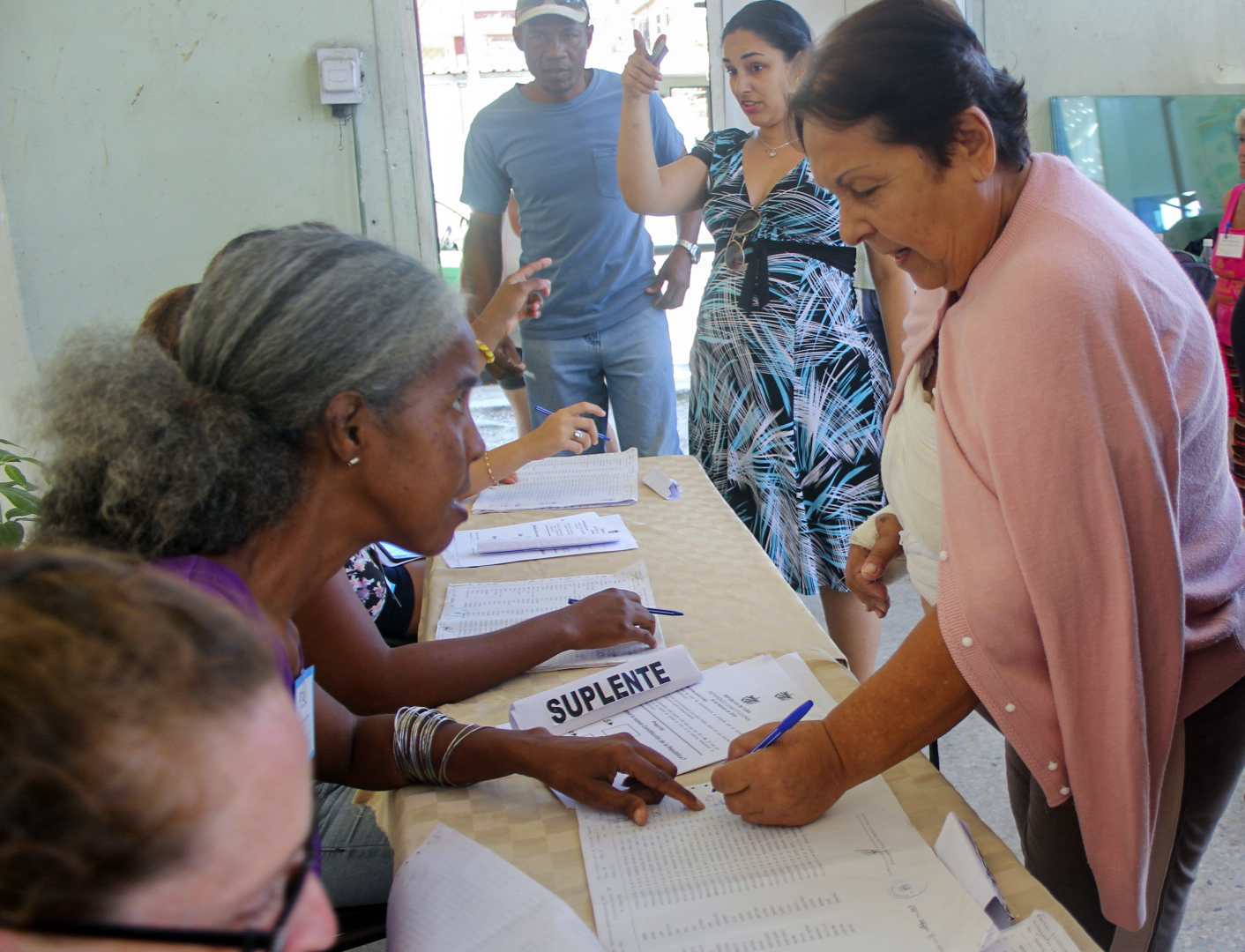

Voting in Havana, February 24, 2019.
The 86.85 per cent of voters who cast ballots on February 24 said YES to the new Constitution -- 6,816,169 Cubans who reaffirmed their commitment to the country's socialist project, respect for rights, and inclusion -- that is the full dignity of the people.
This support, undoubtedly massive, in a popular process in which every citizen acted as a constituent, acquires greater resonance in the current adverse international context, with imperialism beating the drums of war and announcing the end of all utopias.
But Cuba, with 150 years of struggle behind us, is not willing to surrender.
Unity, consciousness, legal culture, revolutionary reaffirmation ... are what prevailed in the constitutional reform process, an experience that will not end with the proclamation of the new Magna Carta.
Next will begin the tremendous challenge of adjusting laws to the Constitution's essence: implementing, acting and, above all, respecting the letter of the supreme law, which is sacred. Every statement is to be put into practice -- that is the challenge -- one that Fidel alerted us to, and that has been assumed as the central focus of the next steps.
The country that results from this YES will be
one that
is with all and for the good of all, for every citizen of Cuba,
regardless of their vote, one that is better every day, always in
Revolution, with the willingness to change what must be changed,
and
confidence in human improvement.

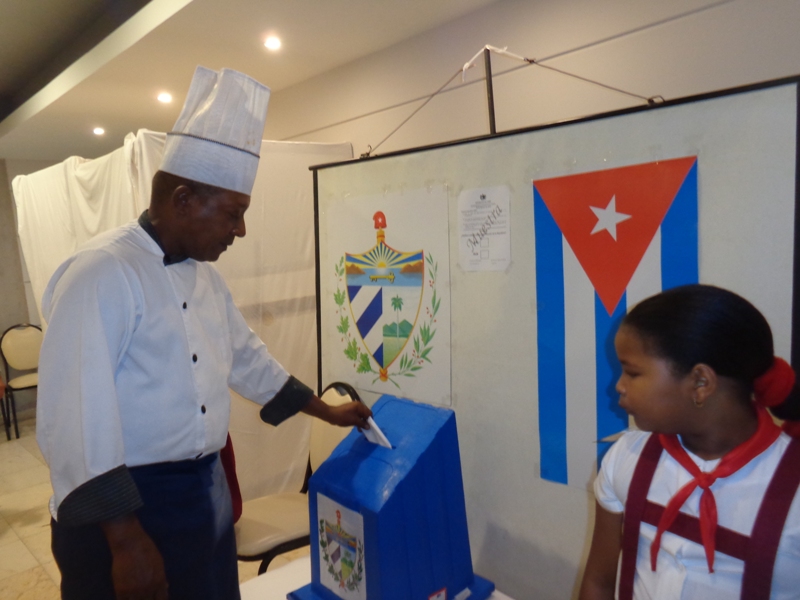
Voting in Santiago de Cuba (left) and Veradero.
(March 1, 2019. Slightly edited by TML for style.)
Electoral
Commission Satisfied
with
Referendum Results
 The National Electoral Commission (NEC)
described as
favourable the results of the referendum held on February 24, in
which
almost seven million voters ratified the constitutional text,
NEC President Alina Balseiro stated.
The National Electoral Commission (NEC)
described as
favourable the results of the referendum held on February 24, in
which
almost seven million voters ratified the constitutional text,
NEC President Alina Balseiro stated.
According to Balseiro, the preliminary results show the Constitution of the Republic of Cuba has been ratified by 6.8 million voters out of a total of 9,298,277 registered voters. The 'Yes' vote represents 86.8 per cent of Cubans who exercised their right to decide.
Meanwhile, 706,400 persons voted 'No,' representing nine per cent of all those who voted and 7.6 per cent of the total persons registered to vote.
Balseiro detailed that the commission worked with 12,635 districts (122 abroad) and 25,345 polling stations (1,048 abroad).
Working in the election were over 225,000 authorities and collaborators (middle school and high school students), besides a contingent of more than 200,000 elementary school students who guarded the ballot boxes, said the Commission president.
Of the total of ballots in the boxes, 7,522,569, representing 95.8 per cent, were valid, while 198,674 or 2.5 per cent were blank and null ones amounted to 127,100 for 1.6 per cent, reported the NEC.
In all, 9,298,277 Cubans were summoned to express their opinion on the new Constitution, approved in December by the National Assembly of People's Power, after a nation-wide discussion by neighbours, students, workers, professionals who proposed changes, to eliminate or add to the text of the Constitution.
The text consecrates the irrevocability of socialism on the island and the leadership role of the Communist Party in this society.
This Constitution expands the individual rights and guarantees, strengthens the people's power in municipalities, promotes foreign investment, contains important changes in the structure of the state and recognizes several forms of property, among them socialist ownership by all the people, as well as private and cooperative ownership.
(Prensa Latina)
D-Day, V-Day and Beyond
This February 23, it was raining false news: trucks crossing the Venezuelan border only on Twitter, and "massive protests" in Havana in which two people yelled and no one chanted along. Several were filming these two, and among those filming could be heard, "Viva la Revolución Cubana!"
D-Day for the enemies of Cuba and Venezuela first became D for 'doubtful' and then D for 'defeat.' For Cuba, as well as Venezuela, V-day began, for 'victory.' For both nations, the Cuban people voted overwhelmingly YES in the referendum to approve the new Constitution on the 24th.
Defeated repeatedly in the latest episode of a conflict that has already lasted 60 years, those who first said that the people had no interest in debate on the new Constitution, then said that there was no transparency in the compilation of results from the popular consultation, and later that no attention would be paid to the population's proposals, were left without excuses, and now say that the YES campaign was so overwhelming, that the NO voice could not be heard.
The truth is that the NO campaign began 10 years ago, when they believed that with Fidel not nominated as head of state, the time had come for a transition to multi-party capitalism. A millionaire in Miami offered to finance the process and the Comandante responded emphatically, "They want to buy us cheap." One of the millionaire's collaborators confirmed recently, "We have devoted exactly 10 years to this effort."
The NO campaign proposed a "multi-party" Cuba, that of blind believers in representative democracy, in which the oligarchy that cannot win organizes a coup, while media and corporate powers vote on a daily basis for the minority that controls them; "moderation" of Cuba's foreign policy to be more acceptable to Washington, whose embassies are behind every anti-democratic conspiracy in Latin America; and the "unbridled cult of wealth" that Martí denounced, a far cry from the recognition of the market and private property included in the new Constitution, along with "increasingly more just redistribution of wealth." The campaign's supporters had the opportunity to express themselves with absolute freedom in the debates, but they were left as a small minority, because the Party that called for and organized the consultation is not sectarian, but rather committed to unity. Just as Fidel defined it:
"Unity means sharing the battle, the dangers, the sacrifice, the objectives, ideas, concepts, and strategies, which are agreed upon via debate and analysis. Unity means the common struggle against annexationists, sell-outs, and the corrupt, who have no relation to a revolutionary militant. This unity around the idea of independence and against the empire advancing over the peoples of Our America, is what I have always referred to."
Barack Obama worked for the NO vote, declaring Venezuela "an unusual, extraordinary threat," and Cuba's principal economic ally was obliged to reduce its deliveries of oil to Havana by half. Rubio and Bolton, with Bolsonaro, worked for the NO, reducing Cuban income earned via medical collaboration, and Mike Pompeo -- like the sword of Damocles -- reduced the suspension of the Helms-Burton Act's Title III to only 45 days.
Millions and millions for subversion -- $50 million each year is the figure publicly reported since Obama's mandate, surpassing any Cuban national budget -- invested in papering the Internet -- that is accessed on the island with difficulties the U.S. blockade has contributed significantly to creating -- most recently to promote the NO vote. As just one example, suffice it to say that an organization based in Miami, which uses the name of God to subvert Cuba, received $2,302,464 from the U.S. government between 2009 and 2017 for "the salvation of a society lost in oppression and persecution," according to the Cubamoneyproject site, which also reported the State Department announcement last week that it is "looking for ideas for new projects to promote democracy in Cuba." According to the casting call, "Selected organizations will receive from $500,000 to $2 million to carry out their projects."
The President of the world's most powerful country gave the NO vote a hand, when Donald Trump promised to eliminate socialism from the Western Hemisphere.
The vote cast in Cuba on February 24 confirmed the victory won the previous day in Venezuela for the dignity of Our America. Because, in addition to the highly democratic process of producing the new Cuban Constitution, it is obvious that Cubans know what would happen if the YES vote had not won, as overwhelmingly as it did, given that our enemies are trying with all possible means to get rid of Maduro, who won 67 per cent of the popular vote with a bigger turnout than his objectors Trump, Macri, and Piñera have ever seen.
Whoever may have disagreed honestly, based on personal opinion, without being part of an enemy campaign, has no need to feel defeated. The defeat is only for the enemies of the homeland and for those who put themselves in the empire's paid service. The benefits, rights, guarantees, and duties that the new Cuban Constitution establishes are for everyone, regardless of how they think or how they voted. Because everyone was called upon and no one excluded from the open process that created the Constitution. It does not matter that the umpteenth strategy is already being implemented, paid for by the usual liars, to disguise their umpteenth failure. Remember that famous joke, popular during Pope John Paul II's visit to Cuba, in which Fidel walked on water and one of the counterrevolutionary slanderers said, "Castro is in a bad way, he can't even swim." With our vote we have won the right to continue improving our country, to work to solve our problems, to eliminate our own obstacles, and to confront those created by others, to do so in peace and with all Cuban men and women of goodwill, who are the vast majority.
(Granma, March 7, 2019. Slightly edited for style by TML.)
U.S. Helms-Burton Act
Statement Denouncing Escalating U.S. Hostility
The U.S. State Department announced today [March 4] the decision to allow, as of March 19 this year, the filing of lawsuits before U.S. courts under Title III of the Helms-Burton Act against Cuban companies included on the List of Restricted Entities issued by that government in November 2017, which was updated one year later. This arbitrary and illegitimate list, intended to tighten the blockade and expand its extraterritorial effects, forbids U.S. citizens from engaging in direct financial transactions with the aforementioned entities. The announcement made by the U.S. State Department also indicated that it would suspend for 30 days only the option of initiating legal action with the same purposes against other Cuban entities or foreign companies which maintain commercial or economic relations with Cuba.
Since its entry into effect in 1996, the Helms-Burton Act has sought to universalize the economic blockade through brutal and illegal pressures exerted by the United States against third countries, their governments, and companies. It is intended to asphyxiate the Cuban economy, and generate or increase shortages among the population with the purpose of imposing in Cuba a government that serves the interests of the U.S.
Given the illegitimate character of the goals
they
pursue,
which are contrary to international law, the Helms-Burton Act and
the blockade arouse universal rejection, which has been
reiterated for almost three decades within the most important
regional and international fora. The most recent example of this
was
the United Nations General Assembly meeting held on November 1,
[2018,]
where this policy has been rejected in 10 consecutive votes, thus
leaving the U.S. completely isolated.
Title II of the Helms-Burton Act states that the overthrow of the revolutionary government, the subsequent tutelage by a U.S. intervenor and the subsequent establishment of a counterrevolutionary government subordinate to Washington, that would no doubt pursue the return to, or compensation for, former owners of all properties they or their descendants might claim, regardless of whether or not they were U.S. citizens at the time the nationalizations took place, or the fact that they abandoned the property. During this entire period, the economic blockade would continue to be fully implemented.
Consequently, Cubans would be forced to return, reimburse or pay U.S. claimants for the house in which they live, the area on which their communities are built, the arable land where they cultivate produce, the school where their children are educated, the hospital or polyclinic where they receive medical assistance, the place where their workplace is located or where they have a private business, and also sites used to provide subsidized services such as electricity, water, and communications enjoyed by the population.
This is an aspiration that can only be conceived by the minds of those who identify Cuba as a colonial possession. According to the Helms-Burton Act, the economic blockade would be lifted only when that ambition is fulfilled.
This law relies on two fundamental lies: the notion that nationalizations carried out soon after the triumph of the Revolution were illegitimate or inappropriate, and that Cuba is a threat to the U.S. national security.
Cuban nationalizations were carried out in accordance with the law, strictly abiding by the Constitution and in accordance with international law. All nationalizations included processes of fair and appropriate compensation, something that the U.S. government refused to consider. Cuba reached and honored global compensation agreements with other nations which are today investing in Cuba, such as Spain, Switzerland, Canada, the United Kingdom, Germany and France.
The real threat to regional peace and security are the irresponsible declarations and actions of the U.S. government as well as the destabilization plans aimed at Latin America and the Caribbean, pursuing the express purpose of imposing the Monroe Doctrine.
The Reaffirmation of Cuban Dignity and Sovereignty Act of December 24, 1996, states that the Helms-Burton Act is illegal, inapplicable, and has no legal value or effect whatsoever. It considers null and void any claim under that law by any individual or legal entity.
According to that law, claims for compensation for nationalized properties could be part of a process of negotiation based on equality and mutual respect between the governments of Cuba and the United States, and be "reviewed together with the indemnifications the Cuban state and people are entitled to as a result of the damages caused by the blockade and aggressions of every sort, for which the U.S. government is responsible". It also makes it clear that those who resort to procedures or mechanisms under the Helms-Burton Act, to the detriment of others, will be excluded from possible future negotiations.
The Cuban Government reiterates to all economic partners and foreign companies operating in Cuba that full guarantees will be granted to foreign investments and joint projects. Article 28 of the Cuban Constitution, which was ratified by an overwhelming majority on February 24, 2019, also recognizes these guarantees, which are additionally included in Law No. 118 on Foreign Investment of March 29, 2014.
Today's decision imposes additional obstacles to our economic development and progress goals, but the United States will continue to fail to achieve its main objective of suppressing by force the sovereign will of Cubans and our determination to build socialism. The majority opinion of the peoples of Cuba and the United States, in favor of improved relations, and the development of civilized, respectful coexistence, will prevail.
Havana, March 4, 2019
|
(To access articles individually click on the black headline.)
Website: www.cpcml.ca Email: editor@cpcml.ca
